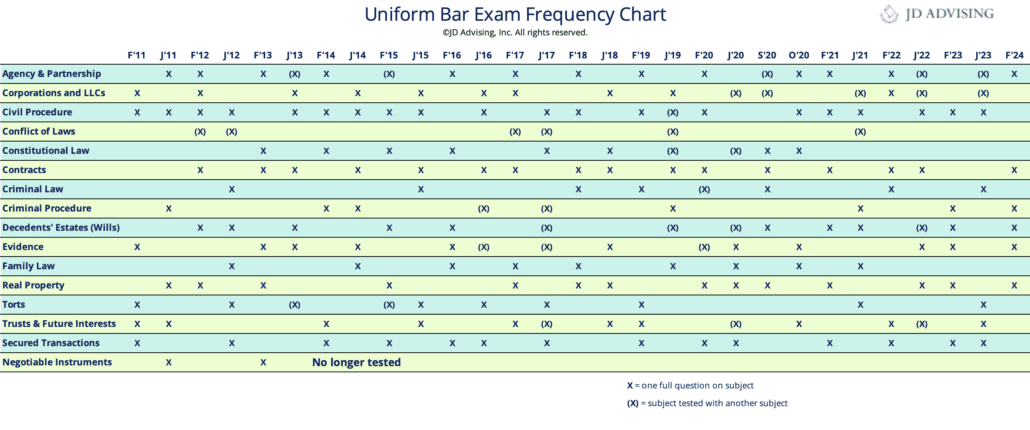How To Predict MEE Subjects That Could Be Tested
How To Predict MEE Subjects That Could Be Tested
Many companies, JD Advising included, attempt to predict which subjects the NCBE will select to test on the next administration of the MEE portion of the Uniform Bar Exam. No one has “inside knowledge” when making these predictions; rather, they are guesses based on patterns we have seen from previous administrations of the MEE. Predicting what subjects might appear on the bar exam can help you decide where to spend some extra time studying, and might warn you if there are subjects more likely to come up where you should spend a little extra time. In this post, we discuss some of the patterns and insights from the MEE Frequency Chart that can help you predict MEE subjects for your bar exam.
How To Predict MEE Subjects That Could Be Tested
 1. First, notice which subjects are tested more frequently than others.
1. First, notice which subjects are tested more frequently than others.
The NCBE does not test all subjects equally. Over the past administrations of the bar exam (since July 2011), certain subjects have appeared more frequently, such as Civil Procedure while other subjects are rarer (e.g., Conflict of Laws). Here is a ranking of the subjects based on how frequently they appeared over the past 22 administrations of the bar exam:
- Civil Procedure (20 full essays plus 1 combined with another subject)
- Agency and Partnership (13 full essays plus 5 combined with another subject)
- Contracts (16 full essays)
- Real Property (14 full essays)
- Secured Transactions (14 full essays)
- Corporations and LLCs (10 full essays plus 5 combined with another subject)
- Evidence (11 full essays plus 3 combined with another subject)
- Decedents’ Estates (Wills) (10 full essays plus 4 combined with another subject)
- Trusts and Future Interests (10 full essays plus 3 combined with another subject)
- Torts (8 full essays plus 3 combined with another subject)
- Constitutional Law (8 full essays plus 2 combined with another subject)
- Criminal Procedure (8 full essays plus 2 combined with another subject)
- Family Law (9 full essays)
- Criminal Law (6 full essays plus 1 combined with another subject)
- Conflict of Laws (This is usually combined with Decedents’ Estates, Family Law, Civil Procedure, or Corporations/LLCs. It is not tested on its own.) (0 full essays, 6 essays combined with another subject)
2. Next, take note of the subjects that have appeared as a “crossover” subject with another subject:
Certain subjects have never been tested as a crossover question with another subject (e.g., Contracts, Real Property, Secured Transactions), while others have appeared numerous times as a crossover question subject (e.g., Conflicts, Agency & Partnership, Criminal Procedure, Evidence, and Decedents’ Estates).
When you make your predictions, be sure to account for those subjects that commonly appear as crossover questions (and what subjects they tend to cross over with). Even if something has been tested somewhat recently, it might still appear as a crossover subject, especially if a subject that it is frequently crossed over with is likely to be tested. Here are the subjects that appeared most frequently as a crossover subject, and what they commonly cross over with:
- Conflict of Laws (This is usually combined with Decedents’ Estates, Family Law, Civil Procedure, or Corporations/LLCs. It is not tested on its own.) (0 full essays, 6 essays combined with another subject)
- Agency and Partnership (13 full essays plus 5 combined with another subject)
- Criminal Procedure (8 full essays plus 2 combined with another subject)
- Evidence (11 full essays plus 3 combined with another subject)
- Decedents’ Estates (Wills) (10 full essays plus 4 combined with another subject)
3. Notice which subjects have been tested back-to-back.
The NCBE has never tested some subjects as an entire essay back to back (this does not count the instances in which the NCBE included the subject as a crossover subject). This also does not take into account the July 2020/September 2020/October 2020 administrations of the bar exam, which we omitted due to the unique nature of those administrations.
The NCBE has not tested the following subjects back-to-back:
- Constitutional Law
- Criminal Law
- Family Law
- Torts
So, if you notice that the NCBE tested one of these subjects on the last administration of the bar exam, it is less likely (but not impossible!) that the subject will appear on your administration of the bar exam. On the other hand, subjects like Civil Procedure and Contracts commonly appear on back-to-back administrations. So, even if those subjects appeared on the last bar exam, they could still very well turn up on your bar exam and are worth your attention!
4. Look at subjects that are ripe for testing.
Next, look at which subjects the NCBE has not tested in a while. Conflict of Laws appeared last in July 2021. Torts appeared last in July 2023. It is entirely likely that subjects absent for several administrations are “ripe for testing,” and thus might be more likely to show up on your bar exam!
5. A few other notes to be aware of:
- Civil Procedure—this has been the most highly tested subject since 2011, appearing on 21 administrations of the bar exam. We suspect that this is partially due to the fact that prior to 2015, the MBE portion of the bar exam did not include Civil Procedure. Nonetheless, since the MBE incorporated Civil Procedure, Civil Procedure still appears frequently among the MEE subjects.
- Although Criminal Law and Criminal Procedure are not frequently tested if viewed separately, looking at them as one subject, they have appeared on 17 administrations of the bar exam. That is about the same frequency with which Secured Transactions appears on the exam. So, even though they don’t seem to appear frequently, there is a fairly decent chance that one of the two subjects (either Criminal Law OR Criminal Procedure) could appear on your bar exam.
- Negotiable Instruments (which tested Article III of the Uniform Commercial Code) is no longer tested on the MEE. You can disregard it for purposes of attempting to predict which subjects will are likely to be on the MEE.
Looking to Pass the Bar Exam?
Free Resources:
- 🌟Bar Exam Free Resource Center: Access our most popular free guides, webinars, and resources to set you on the path to success.
- Free Bar Exam Guides: Expert advice on the MBE, the MEE, passing strategies, and overcoming failure.
- Free Webinars: Get insight from top bar exam experts to ace your preparation.
Paid Resources:
- 🏆One-Sheets: Our most popular product! Master the Bar Exam with these five-star rated essentials.
- Bar Exam Outlines: Our comprehensive and condensed bar exam outlines present key information in an organized, easy-to-digest layout.
- Exclusive Mastery Classes: Dive deep into highly tested areas of the MBE, MEE, MPT, and CA bar exams in these live, one-time events.
- Specialized Private Tutoring: With years of experience under our belt, our experts provide personalized guidance to ensure you excel.
- Bar Exam Courses: On Demand and Premium options tailored to your needs.
- Bar Exam Crash Course + Mini Outlines: A great review of the topics you need to know!
🔥 NEW! Check out our Repeat Taker Bar Exam Course and our new premier Guarantee Pass Program!








Leave a Reply
Want to join the discussion?Feel free to contribute!